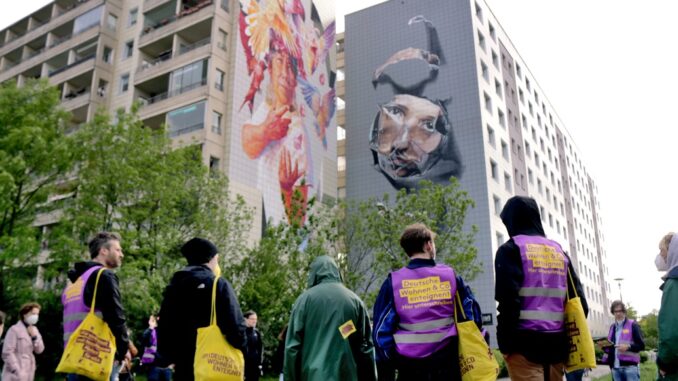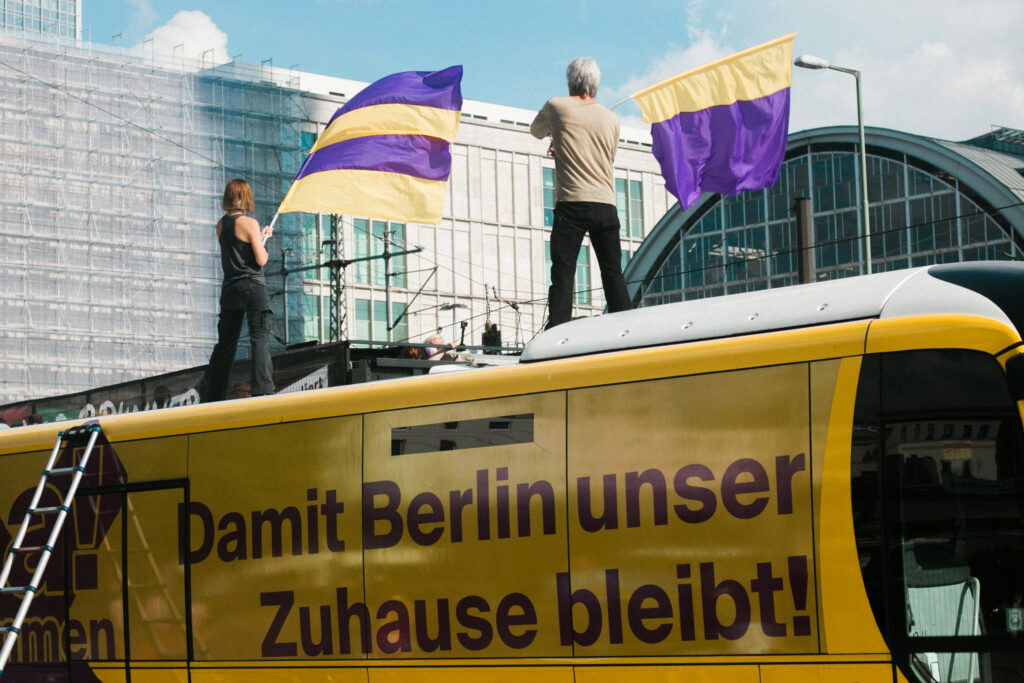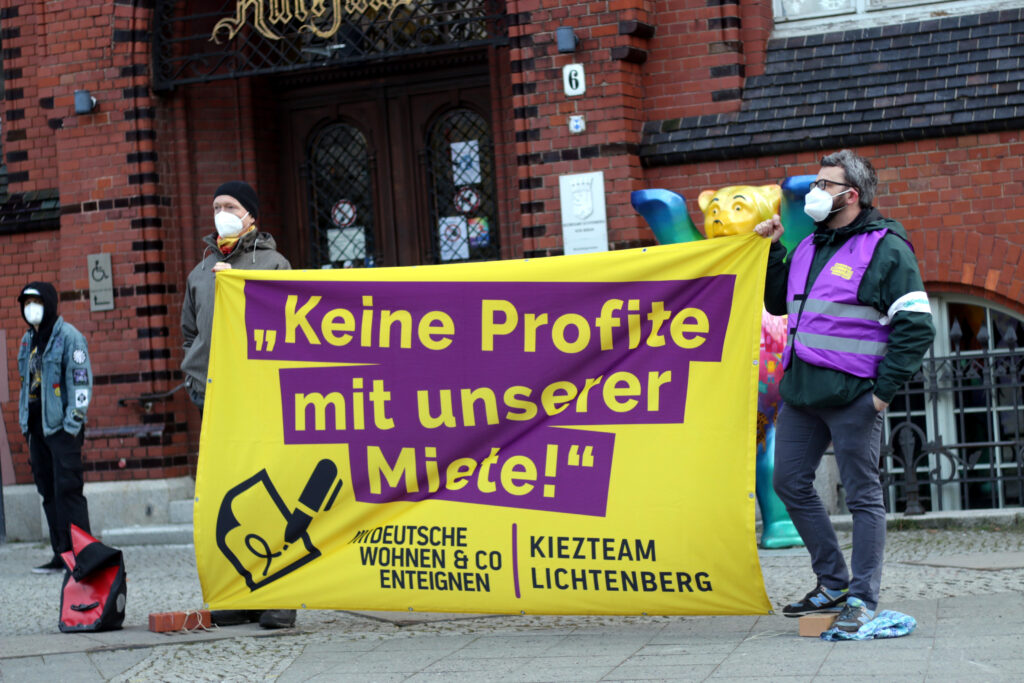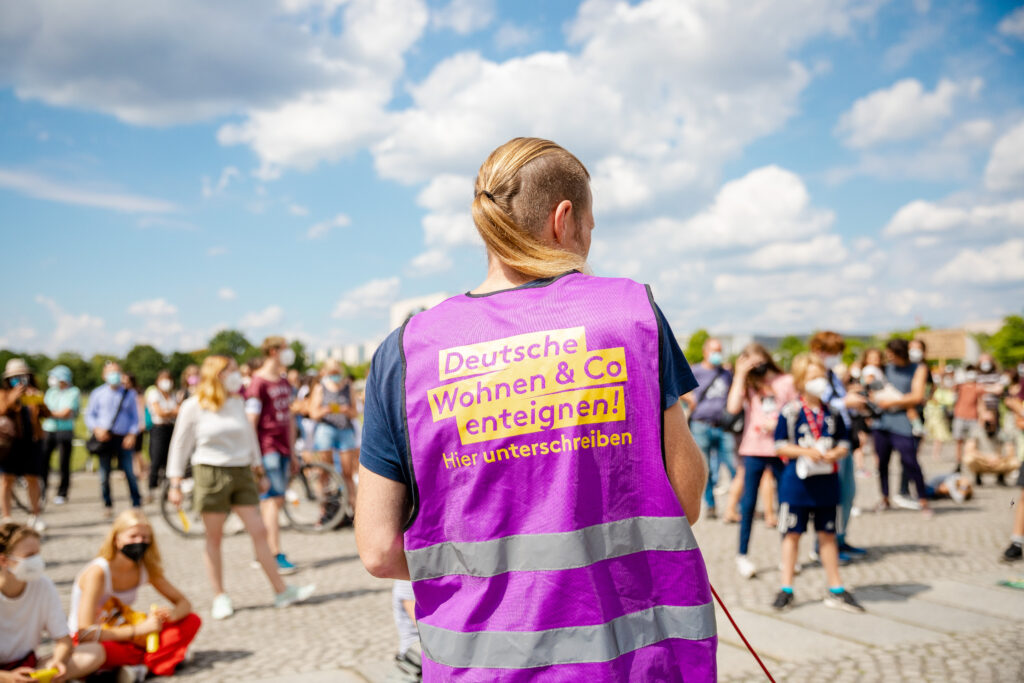
Reportage: Carolina Menéndez Trucco
In September 2021, the Berlin renters’ movement celebrated a first victory. Almost 60% had voted in favor of the socialization of the city’s large real estate companies. As a result of the popular mobilization that gathered signatures for the referendum promoted by the Deutsche Wohnen & Co. enteignen expropriation initiative, the Senate created a commission of experts to examine how to implement it. But since then, not much has happened, except the political decision to delay it and that rents have continued to increase. Tired of waiting, the initiative is trying again today: with a law as an ace up its sleeve, expropriation should work this time. Will Berlin be able to expropriate the big real estate companies in the face of the exorbitant increase in rental prices and financial speculation? Public housing with tenants involved in the administration would not only mean relief in pockets, but also improved maintenance and renovation of buildings. We talked to Rolf Souschek, DWE activist, about whether it is possible to excite Berliners again and what is at stake in this key fight in the battle for socialization.
Carolina: The expropriation referendum took place two years ago. Now, yellow and purple signs have reappeared all over the city. The Deutsche Wohnen & Co enteignen (DWE) initiative announced that it will start another one, this time with a concrete law as a basis. How did this step come about, and what is the goal?
Rolf: Firstly, the socialization law announced by the Berlin Senate is really very far away, almost in 2024. Reports were supposed to be done and commissioned externally, but it was delayed and delayed and delayed. There has also been a change in leadership, now the Christian Democrats and the SPD are in government, and everything seems very far away. But almost 60% voted in favor, so we want to hold the referendum again, a bill will be presented and then voted on. I can imagine a good result.
Carolina: In the German capital there is talk of a fair rental model, what is basically being demanded?
Rolf: Yes, that’s what we demand, and we just do. So you just have to look at history. Berlin was divided in two, there was no private property at all, they were all cooperatives. Large social housing like GWO[1] or other organizations, which in the 90s, after the fall of the Wall, were privatized. Around 260,000 apartments and land ownership now belong to people like Vonovia[2]. The neoliberal model has caused rents to rise sharply, and the fact that big companies can now actually play politics is the reason why a fair rental model no longer exists. People who struggle to earn their wages can no longer afford to live in the center of the city; therefore, they are expelled to the outskirts, and the rich to the center. Among other things, that is what is destroying Berlin. This is why it is so important that this referendum succeeds.
Carolina: The campaign will write the law itself. To achieve this, 20,000 signatures are needed for the first stage, and then another 170,000 for the next. Do you think it is possible to mobilize successfully again?
Rolf: The situation has been worsened by inflation and also by all the indirect salary cuts that accompany it. But I think we need to mobilize again for this. The campaign has already started and now everything is very active. I can’t look too deep into the glass, but I firmly believe we know what we’re fighting for. That is the point.
Carolina: Ultimately, it is in the hands of the Senate to pave the way for the new referendum or not. Could its fate be different, since this time there should be a law?
Rolf: Of course, it’s in combat. I think it depends on how strong this campaign is. 60% of Berliners voted for it, and even a Berlin Senate that does not want that at all cannot ignore it without notice. It depends on what the first stage is like as well. The first 20,000 signatures will not be a problem. According to how these processes work, strong digitalization plays an important role. You have to start the fight to simply achieve clarity.
Carolina: Since the successful first referendum, the situation in Berlin’s real estate market has worsened. Just at the beginning of this year, rents increased almost 30% in three months, even those of state companies up to 3%. However, the rental movements are no longer so visible: there have been no large demonstrations. What do you think could be the reasons?
Rolf: In my opinion, the disputes are not only about rents, agreements, owners, but rather salary fights, and there were many this year. We are in a difficult situation: Palestine, inflation, union struggles, conflicts over wage increases… That’s why I don’t think there was any reason to mobilize, so to speak, all the groups of tenant representatives. Now, with the new referendum, it is definitely more feasible.
Carolina: In the last final report of the experts commission, the conclusion was reached that the socialization of real estate companies was possible. However, the black-red Senate announced that it will only develop a framework law that does not automatically lead to this. Have the political winds changed since the rerun elections in Berlin? 28% of the CDU has clearly opposed the expropriations…
Rolf: I don’t think they’ve changed too much because it’s actually a standard. The CDU has always had high percentages, and if you look closer, the decision has already been made: Zehlendorf, Steglitz, Charlottenburg, Wilmersdorf are the eastern districts where the CDU is very strong and the middle-class lives. In the western part, however, for example in Marzahn, Hellersdorf, Neukölln, Kreuzberg, socialization has always had potential. In this sense, they have not changed at all, on the contrary, I believe that the situation has become much more critical in terms of pensions, salaries, rents, which ultimately could help the initiative.
Carolina: And Die Linke, didn’t it lack a revolutionary strategy, policy?
Rolf: Die Linke has supported this campaign, but they are incredibly busy with themselves: the party is in the process of dissolving. So, I don’t think there’s a big pull for change and strategy right now. But it also shows other weaknesses. For example, in the face of massive human rights violations in Gaza, they did not formulate their position on what is happening in a firm way. Little is heard about it.
Carolina: How did you become part of this initiative?
Rolf: Well, I have always been involved in politics. In Germany, I am in a group that actively supports this referendum, which is not the solution for everything, but it is a great step.
Carolina: Launched by several tenants associations and with the support of several unions, DWE has undoubtedly set an important precedent in the fight for the socialization of property. Do you take any action to support those with housing problems? Due to rent arrears, there were around 30,000 forced evictions in 2022.
Rolf: That’s exclusion. What I said, at the beginning, that socially weak people are expelled from the center and from everywhere. At the “end of Berlin” there are still apartments, but many comrades are even outside the social process, they cannot even afford to rent a home. Therefore, it is a displacement process that can begin with the inability to pay rent.



[1] Housing Cooperative: Genossenschaft für Wohnungsbau Oberland eG
[2] Vonovia is a German real estate group, the largest company in the sector in Europe, a price driver, which is listed on the stock exchange.








